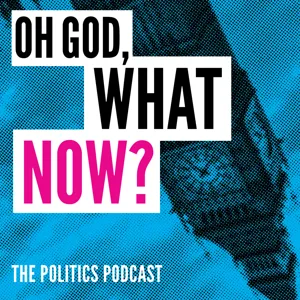Podcast Summary
Nadine Dorries' Long-Standing Effort to Resign as an MP: Nadine Dorries, a former culture secretary, has been trying to resign as an MP for months, but her resignation hasn't been accepted yet. She keeps her role and salary while causing discomfort to PM Boris Johnson with her criticism. She's yet to formally resign or pay Talk TV or Daily Mail for her fees.
Nadine Dorries, the MP for Mid Bedfordshire, has been trying to resign as an MP for months, but her resignation has yet to be officially accepted. Dorries, who previously served as secretary of state for culture, media, and sport, has been using her resignation as a way to cause discomfort to Prime Minister Boris Johnson. She has also kept her role in parliament and continues to receive her MP's salary. Dorries has cited various reasons for her resignation, including her description in a magazine as a "quasi MP" and the fact that she still employs her daughter as a parliamentary researcher. However, she has yet to formally resign or bill Talk TV or the Daily Mail for her fees, suggesting that she may still need the income. The resignation letter, which was exclusively released to the Daily Mail, was unusually long and critical of Rishi Sunak. Despite its length, Dorries has not yet been replaced as the MP for Mid Bedfordshire.
Nadine Dorries' Personal Achievements and Reflections in Resignation Letter: Nadine Dorries, in her resignation letter, highlighted her increased Conservative Party majority, criticism of government actions, and disregard for factual accuracy, demonstrating her conviction and disregard for truth.
Nadine Dorries' resignation letter, while adhering to the standard template, contained her personal achievements and reflections. She highlighted her increase in her Conservative Party's majority in her constituency and her criticism of the government's actions. Dorries also mentioned her disappointment over not receiving a promised gong, which she compared to the actions of individuals like Donald Trump, Mohammed Fayed, and Jeffrey Archer. Despite being proven wrong in her statements, Dorries showed a lack of concern for factual accuracy and continued to make bold claims without shame. This behavior, combined with her increase in her constituency's majority, showcases Dorries' unique blend of conviction and disregard for the truth.
Corruption and Resignations in the Conservative Party: The Conservative Party in the UK has faced a series of resignations and allegations of corruption, leading to a democratic deficit and raising questions about the perceived integrity of its political leaders.
The political landscape in the UK, particularly within the Conservative Party, has been marked by a series of resignations and alleged corruption, leading to a democratic deficit. Former MP Nadine Doris, in her upcoming book, exposes this issue, which she believes has led to the downfall of several prime ministers. However, her perspective raises questions, as she seems to wish for more prime ministers to have lost elections, despite being a Conservative herself. Meanwhile, some individuals involved in these events, like Chris Pincher, remain in power. The situation is a complex one, with many resignations and allegations, but the underlying issue remains the perceived corruption within the democratic process at the heart of the party.
Nadine Dorries shares stories from her political career and experiences at Buckingham Palace: British politician Nadine Dorries reflects on her role as Chancellor of the Duchy of Lancaster and her memorable experience using traditional wooden loos at the Women's International Women's Day Reception at Buckingham Palace, emphasizing the enduring nature of British royalty and politics.
Nadine Dorries, a British politician, shared stories from her political career, including her experiences serving in various governments and attending events after Queen Elizabeth II's death. She mentioned her role as Chancellor of the Duchy of Lancaster and her attendance at the Women's International Women's Day Reception at Buckingham Palace, where she was impressed by the traditional wooden loos. Despite the many changes and expectations during King Charles III's reign, Dorries found the Royal Loos to be a unique and memorable experience. Despite some confusion about past events and figures, such as Liz Truss, Dorries emphasized their reality. Overall, Dorries' stories highlighted the traditional elements of British royalty and politics, as well as her personal experiences and observations.
Modernizing the Monarchy: Changes and Controversies: Prince Charles seeks to modernize the monarchy by reducing staff and addressing food waste, but faces potential PR challenges due to past backlash. Camilla opts for a smaller household, while Prince William may face criticism for his extensive property holdings.
The British monarchy is undergoing significant changes as Prince Charles aims to modernize the institution by reducing the number of royal staff and addressing issues of food waste. However, these efforts come with potential PR challenges, as past attempts to streamline the monarchy have sparked backlash and criticism. Additionally, Camilla, the future queen consort, has reportedly opted to stay at a different castle during their visit to Balmoral to avoid the "royal flummery" and large staff. The royal family's vast collection of properties and their perceived extravagance, despite calls for change, continue to be a source of controversy. Prince William, the heir to the throne, may also face challenges in presenting a more relatable image if he wishes to reduce his own extensive property holdings.
The monarchy's historic privilege clashes with modern attempts to present a relatable image: Prince William's contrasting image as a relatable royal and his extensive property portfolio highlights the monarchy's struggle to reconcile its historic privilege with modern expectations.
Despite Prince William's successful PR campaign positioning him and Kate as relatable, middle-class royals, the monarchy's historic privilege and wealth continue to present challenges to modernizing its image. Prince William's extensive property portfolio, passed down through generations, contrasts sharply with his millennial status and the average homeowner's ability to afford a home. The monarchy's unimaginable privilege is at odds with attempts to present a modern, relatable image. Meanwhile, speculation about Meghan Markle's potential return to social media as an influencer has sparked excitement, reminiscent of the Laura Ashley-esque influencer vibes from the seventies. However, the monarchy's entrenched traditions and privileges continue to present significant hurdles to meaningful change.
Police Decision on Royal Charity Fund and May's Memoir: The Metropolitan Police's decision not to investigate the royal family's charity fund raises doubts about their investigative abilities, while Theresa May's memoir may offer a humble perspective on her failed tenure as Prime Minister, but its impact is uncertain due to the genre's lackluster sales unless the author is a high-profile figure.
The Metropolitan Police's decision not to investigate further into the charity fund of the British royal family has left many questioning their investigative abilities. Meanwhile, former Prime Minister Theresa May is releasing a memoir, but its relevance and impact are uncertain given the failure of her tenure in office. The political memoir genre generally doesn't sell well unless the author is a high-profile figure like Tony Blair or Barack Obama. May's memoir may offer a more humble perspective on her time in office, acknowledging her failures and the catastrophic outcome of her Brexit negotiations. Other political figures, like Nicola Sturgeon and Nadim Zahawi, are also releasing memoirs, adding to the growing list of political reflections.
Reasons for publishing political memoirs and biographies: Political memoirs and biographies are published for setting the record straight, potential long-term connections, and the assumption they might eventually become bestsellers. The publishing industry's model involves small advances and selling exclusive stories to newspapers, not quite vanity publishing but not commercial either.
Political memoirs and biographies, despite not always selling in large numbers, continue to be published due to various reasons. These reasons include setting the record straight, potential long-term connections, and the assumption that they might eventually become bestsellers. The publishing industry's traditional model for political books involves small advances, with authors making additional money through selling exclusive stories to newspapers. This model is not quite vanity publishing but not a commercial book industry in the same way as working with one of the big five publishers. Some politicians, like Tony Blair and Barack Obama, have had successful sales, but many others, like Gordon Brown, have struggled. The industry continues to publish these books, even though they may not sell well, as it's considered part of the norm.
Excalibur Healthcare's Success Story During the Pandemic: Excalibur Healthcare made £13M from selling ventilators and PPE to the UK government, highlighting the entrepreneurial spirit and importance of being in the right place at the right time during a crisis.
The pandemic created unprecedented opportunities for businesses, particularly in the medical equipment sector. One such company that thrived was Excalibur Healthcare Services Limited, led by medical entrepreneur Sir Chris Evans. Excalibur made a significant profit by supplying ventilators and PPE to the UK government during the crisis. The price of ventilators skyrocketed due to high demand and middlemen involvement, leading to large contracts worth millions. The exact price paid to China remains unclear, but Excalibur's 2021 accounts show they made £13,000,000 from these sales. The pandemic's aftermath brought intrigue, as some questioned the fairness of these prices. Future memoirs from politicians and insiders may shed more light on this period. Regardless, Excalibur's success story underscores the entrepreneurial spirit and the importance of being in the right place at the right time.
Government outsourced COVID-19 supply procurement to businessmen with China contacts, raising profits and suspicions: During crises, lack of transparency in government procurement processes can lead to potential profiteering and suspicions
During the COVID-19 pandemic, the British government outsourced procurement of essential supplies like PPE and ventilators to businessmen with existing contacts in China. These businessmen made significant profits by sourcing these supplies and selling them to the government. Sir Chris Evans, one such businessman, made a profit of £13 million and then transferred his healthcare company to two unknown individuals, insisting it was a genuine business transfer. However, the lack of experience of the new owners in medical supply businesses and the questionable origins of the sale raise suspicions. The situation highlights the potential for profiteering during crises and the need for transparency in government procurement processes.
Some PPE companies made profits but went bankrupt owing taxes: Despite substantial profits, some PPE companies went bankrupt, leaving large tax bills unpaid, and debts to suppliers.
During the pandemic, some companies in the PPE supply industry made substantial profits but went bankrupt before paying their substantial tax bills. For instance, a company owing £13 million in profits paid only £2.1 million in corporation tax, leaving a £2.9 million gap. The company went into administration, owing money to various suppliers, including HMRC for £2.1 million in unpaid taxes. The reason for the company's quick bankruptcy is believed to be the lack of cash left in the company due to debts that were handed over to the new owners and written off. The former owner claimed that the recovery process was underway when he sold the company but did not work out, and he was also challenging the tax bill's correctness. The profits made by the company were not given away but reinvested elsewhere, yet the company still went bankrupt. The concern is that this may not be an isolated case, and other PPE supply companies may be following a similar pattern.




